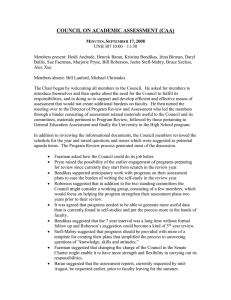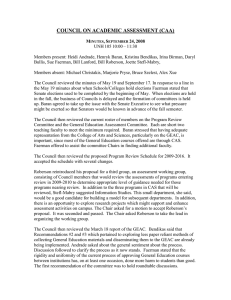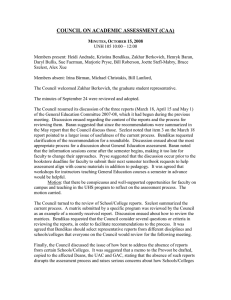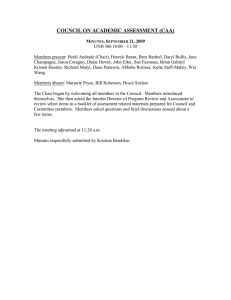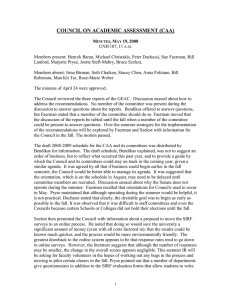October 29, 2008
advertisement
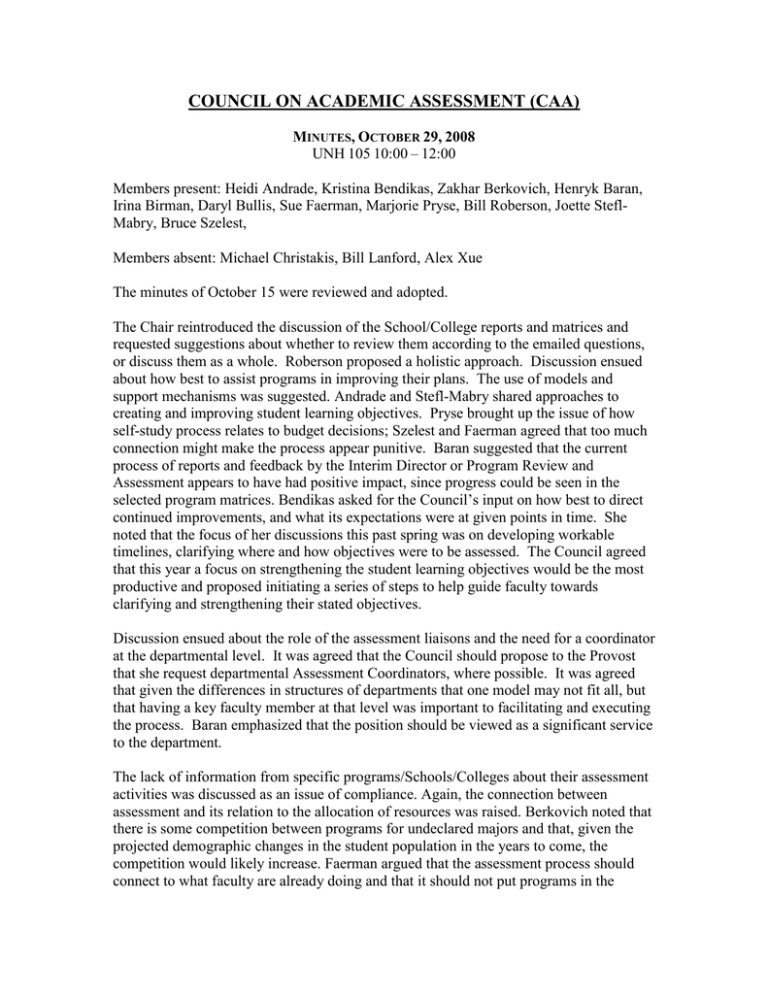
COUNCIL ON ACADEMIC ASSESSMENT (CAA) MINUTES, OCTOBER 29, 2008 UNH 105 10:00 – 12:00 Members present: Heidi Andrade, Kristina Bendikas, Zakhar Berkovich, Henryk Baran, Irina Birman, Daryl Bullis, Sue Faerman, Marjorie Pryse, Bill Roberson, Joette SteflMabry, Bruce Szelest, Members absent: Michael Christakis, Bill Lanford, Alex Xue The minutes of October 15 were reviewed and adopted. The Chair reintroduced the discussion of the School/College reports and matrices and requested suggestions about whether to review them according to the emailed questions, or discuss them as a whole. Roberson proposed a holistic approach. Discussion ensued about how best to assist programs in improving their plans. The use of models and support mechanisms was suggested. Andrade and Stefl-Mabry shared approaches to creating and improving student learning objectives. Pryse brought up the issue of how self-study process relates to budget decisions; Szelest and Faerman agreed that too much connection might make the process appear punitive. Baran suggested that the current process of reports and feedback by the Interim Director or Program Review and Assessment appears to have had positive impact, since progress could be seen in the selected program matrices. Bendikas asked for the Council’s input on how best to direct continued improvements, and what its expectations were at given points in time. She noted that the focus of her discussions this past spring was on developing workable timelines, clarifying where and how objectives were to be assessed. The Council agreed that this year a focus on strengthening the student learning objectives would be the most productive and proposed initiating a series of steps to help guide faculty towards clarifying and strengthening their stated objectives. Discussion ensued about the role of the assessment liaisons and the need for a coordinator at the departmental level. It was agreed that the Council should propose to the Provost that she request departmental Assessment Coordinators, where possible. It was agreed that given the differences in structures of departments that one model may not fit all, but that having a key faculty member at that level was important to facilitating and executing the process. Baran emphasized that the position should be viewed as a significant service to the department. The lack of information from specific programs/Schools/Colleges about their assessment activities was discussed as an issue of compliance. Again, the connection between assessment and its relation to the allocation of resources was raised. Berkovich noted that there is some competition between programs for undeclared majors and that, given the projected demographic changes in the student population in the years to come, the competition would likely increase. Faerman argued that the assessment process should connect to what faculty are already doing and that it should not put programs in the position of having to validate themselves for resources. The Council agreed that a letter to the Provost should be drafted to express concern about programs and Schools/Colleges which were not in compliance with the university’s requests for assessment activities. The Council then moved on to the issue of how to address accredited programs. It was determined that the Council should look at the assessment requirements of all the different accrediting bodies and determine how closely they align with the university’s expectations. Once that is determined it will identify what information it needs from which accredited program. Szelest suggested that rather than undertaking the process immediately, the Council wait until the preliminary report by the Middle States Subcommittee on Institutional and Student Learning Assessment. Since it was already reviewing accredited programs, the Council could be more efficient in its review by not duplicating their efforts. Action steps: 1. Roberson and Bendikas will develop appropriate interventions for programs working on strengthening their student learning objectives. 2. Bendikas will draft a letter to the Provost on behalf of the Council to recommend that each department have an Assessment Coordinator to act as the faculty point of contact at the departmental level. 3. The Council will schedule a review of the student learning assessment requirements of the accrediting bodies currently accrediting programs at the University after it has the draft report by the Middle States Subcommittee on Institutional and Student Learning Assessment. After that review it will determine what, if any, additional information it may need from accredited programs. 4. Bendikas will draft a letter to the Provost on behalf of the Council expressing its concern over programs and School/Colleges that have not submitted requested assessment materials The meeting adjourned at 11:40 a.m. Minutes respectfully submitted by Kristina Bendikas
